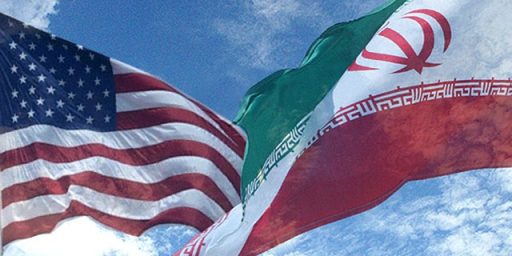The Human Rights Case Against Attacking Iran
Shirin Ebadi, the 2003 winner of the Nobel Peace Prize and Hadi Ghaemi, a researcher for Human Rights Watch, offer up “The Human Rights Case Against Attacking Iran” in today’s NYT.
American policy toward the Middle East, and Iran in particular, is often couched in the language of promoting human rights. No one would deny the importance of that goal. But for human rights defenders in Iran, the possibility of a foreign military attack on their country represents an utter disaster for their cause.
The situation for human rights in Iran is far from ideal. Security forces harass, imprison and even torture human rights defenders and civil society activists. The authorities attack journalists and writers for expressing their opinions and regularly shut down newspapers. Political prisoners languish in jails. Superfluous judicial summonses are routinely used to intimidate critics, and arbitrary detentions are common. But Iranian society has refused to be coerced into silence. The human rights discourse is alive and well at the grassroots level; civil society activists consider it to be the most potent framework for achieving sustainable democratic reforms and political pluralism.
[…]
Respect for human rights in any country must spring forth through the will of the people and as part of a genuine democratic process. Such respect can never be imposed by foreign military might and coercion – an approach that abounds in contradictions. Not only would a foreign invasion of Iran vitiate popular support for human rights activism, but by destroying civilian lives, institutions and infrastructure, war would also usher in chaos and instability. Respect for human rights is likely to be among the first casualties.
Instead, the most effective way to promote human rights in Iran is to provide moral support and international recognition to independent human rights defenders and to insist that Iran adhere to the international human rights laws and conventions that it has signed. Getting the Iranian government to abide by these international standards is the human rights movement’s highest goal; foreign military intervention in Iran is the surest way to harm us and keep that goal out of reach.
Of course, this argument would have precluded invasion of Germany to oust Hitler. Instead, we should have said nice things about the Jews and encouraged them to stand up for their freedom while all the while insisting that the Nazis play nice.
It strikes me that the political and military case for not invading Iran–it’s not necessary and probably wouldn’t achieve our objectives–is a hell of a lot stronger.






The sad reality is that only violence ended slavery in the American South, defeated Naziism, or ended Japanese militarism. I don’t know who first said it but the inability to distinguish between categories of evil is the inability to distinguish between good and evil. And it’s a problem that characterizes many anti-Western intellectuals—both Westerners and not.
I kind of agree sometimes you have to have war, in order to protect those who are innocent.
I wonder how many times human rights violators have been stopped through non violent means? And good historians around?
Well, rather than encouraging them to stand up for their freedom, one could emulate Gandhi and suggest that they go quietly to their deaths, in the hope that their example would provide “an appreciation of human dignity.”
But if the Jewish mind could be prepared for voluntary suffering, even the massacre I have imagined could be turned into a day of thanksgiving and joy that Jehovah had wrought deliverance of the race even at the hands of the tyrant. For to the godfearing, death has no terror. It is a joyful sleep to be followed by a waking that would be all the more refreshing for the long sleep. —November 26, 1938
I don’t know about invading Iran, as we do not have the military strength now to effectively do so, but we have military on both sides of Iran. I would inform the mullas we have stationed a Ohio class submarine within striking distance of Iran, and if they were to attack any nation with a nuclear weapon, a full thermonuclear response would follow.
Funny how no one is mentioning the “humanitarian rights” issues associated with, say, a nuclear catastrophe, in Iran.